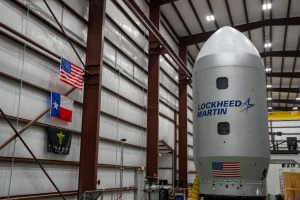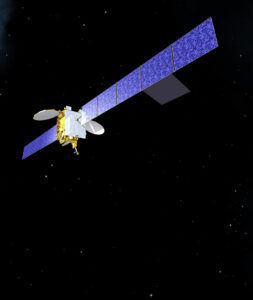OT Looks Back: People and the Space Industry in 2023
25th Dec 2023
A typical end-of-year article regarding the space industry would focus on the achievements and “Space is hard” moments of the 12 months passed. At Orbital Today, we’ve decided to look at the year through the lens of the people who work in it. Not that these people are objects that refract light, or that they collectively own one such refracting thing. Rather, if we focus on the people in the space industry in 2023 and what they’ve done (or not), then we can draw some novel conclusions about where this most human of endeavours is going.
A Tale of Two Crashes
Our ‘Annus Horribilis‘ running tab of mission mishaps over the course of 2023 covers some of the biggest events of the year. What that article doesn’t cover are the successes that accompanied those missions, or the reactions of the people connected to them.
Let’s look at two of those space industry 2023 events: Virgin Orbit’s Launcher One failure on 12th January, and ispace’s M1 lander crashing into the Moon on 25th April. Both of these missions experienced sudden unexpected velocity aberrations that ultimately could have been prevented, with a filter on Launcher One dislodging and M1 running out of fuel. Mechanical failures and calculation issues are nothing new in aerospace endeavours. However, think back to how VO owner Richard Branson and ispace founder Takeshi Hakamada reacted.
From the limited perspective of one editor, it seems that Branson & Co essentially shrugged, said, “Space is hard, mate,” and, despite having a better launch success record than SpaceX for that number of attempts, went on to close up shop.
Now, compare that to the announcement by Hakamada and the ispace team. You can find it in the last eight minutes of the M1 landing Live Stream:
In a interview coming out shortly, we asked ispace Business Development Director Jenna Tiwanna about the reaction to the M1 crash, and in short, it seems that investors and partners responded to the sincerity of the team.
Looking back on 2023, Takeshi Hakamada told Orbital Today:
“The past year was a hugely successful year not only for the space industry, but specifically for all of us at ispace. It will be remembered as a decisive year for our company, marking several important first steps as a growing space company.
“We completed Mission 1, a great achievement becoming the first commercial space mission to reach the moon. The mission demonstrated that it is feasible for the private sector to execute these missions, making the cislunar economy a reality.
“We were listed on the Tokyo Stock Exchange, named our new U.S. CEO and opened a facility in the U.S., announced details about Mission 2, and were recognized with a significant innovation grant by the Japanese government.
“While looking back on last year’s achievements we are determined to “Never Quit the Lunar Quest” in the new year!”
We would reach out to VO for a comment, but the company has failed to proceed. Space belongs to the passionate and determined, it seems.
Government Support is In
UK Space Agency have been very, very busy in 2023. Orbital Today was pleased to be able to ask UKSA Commercial Director Matt Archer a few questions early in the year (you can find the Matt Archer interview here). UKSA have been putting money into the industry regularly, and supporting the growth its talent base as well.
Dr Paul Bate, Chief Executive at the UK Space Agency, said:
“We are building one of the most innovative and attractive space economies in the world. It has been a year of delivery in the UK. From the launch at Spaceport Cornwall to our renewed participation in the Copernicus programme, and with key UK instruments on board the JUICE and Euclid science missions, the UK continues to grow as a space nation, unlocking opportunities to enhance life on Earth.
“We are protecting UK interests in space, shaping the space environment, and using space to help solve some major challenges at home and overseas. Through cutting-edge research, we are inspiring the next generation and sustaining the UK’s competitive edge in space science and technology. It’s an incredibly exciting time to work in space, where the possibilities are truly limitless.”
Craig Brown, Investment Director, at the UK Space Agency said:
“The UK Space Agency delivers key elements of the government’s National Space Strategy, from unlocking growth and developing new national capabilities to investing in research, innovation and development, and fostering new international collaborations.
“We’ve increased our investments year-on-year by around 30%, and established new schemes such as our £65 million National Space Innovation Programme and the £50 million Space Clusters and Infrastructure Fund, ensuring that the benefits of the growing sector are felt across the whole of the country. We’re attracting major international businesses to the UK, with recent investments announced by Lockheed Martin in the North-East of England, and MDA committing to double its UK workforce.
Vapourware is out
Two other events to note are India’s successful landing at the South Pole of the Moon and the ouster of Orbex CEO Chris Larmour. The first shook the space industry – India joins an elite club enjoying success in lunar missions. By contrast, the second hopefully shook up a corner of northern Scotland. While the Indian space program has been taking the industry by storm over the last few years, Larmour’s departure was marked by recognition that under his control, Orbex were treading water.
Melissa Quinn Beams Herself Down!
One of the shocking changes early in 2023 came when Melissa Quinn stepped down as CEO at Spaceport Cornwall (I mean really… a spaceport that actually hosted a launch… it’s like stepping down from commanding the Enterprise). Her new position, though, as Managing Director of Seradata places her even closer to one of the gold mines of the industry: data. So, we asked her for her very well-placed vision regarding 2023 and also the role of women in an industry that many claim is having a difficult time filling vacancies.
In 2023 our data shows the most ever: launches, spacecraft deployed, density of spacecraft in LEO, satellite maneuvers in LEO and number of satellites in GEO. All this data reiterates that space, especially LEO, is becoming more congested, and in turn, contested. More information on what is happening in orbit is critical to keep it safe. In addition, we are seeing space sustainability from a debris perspective not just be a hot topic in the industry, but hit headlines in the media and awareness of the general public.
…and
Although I am increasingly not the only woman on space panels and at space meetings, which is great, there is still more that needs to be done. We need more women, and overall diversity, in active leadership roles. We also need to put more women from the industry in front of young people, boys and girls, to break down stereotypes. Finally, the UK Space Industry needs to transform traditional ways of working, like gender gap in salaries, maternity pay, whistleblowing processes, and even altering the way we run events & conferences to make women feel safe.
What’s next for 2024?
Remember how Silicon Valley became such a powerhouse? It wasn’t just the concentration of technology, it was the concentration and interaction of people. Coupled with a pay-it-forward and collegial atmosphere, ideas could be exchanged and hashed out at will. Is a lunar community forming on Earth already? We’ll be looking at that beginning with our first interviews of the year.
Western governments collectively shrieked, “QI’yaH!” in 2022 when Russia’s full-scale invasion of Ukraine carried a distinctive satellite-based facet. Fast forward to 2023, and it’s Israel and the first intercept of a ballistic missile above the Kármán line. Space Domain Awareness has become vital to governments and, increasingly, corporations trying to be active in orbit.
These issues and more will be covered in our 2024 prognosis coming soon!






Thank you for your comment! It will be visible on the site after moderation.